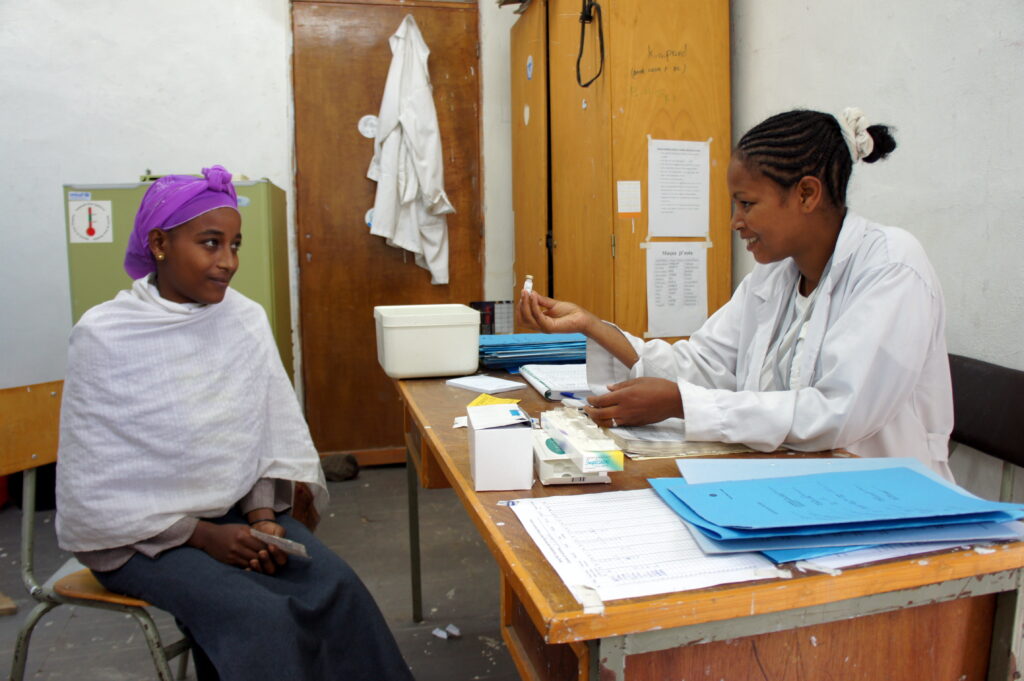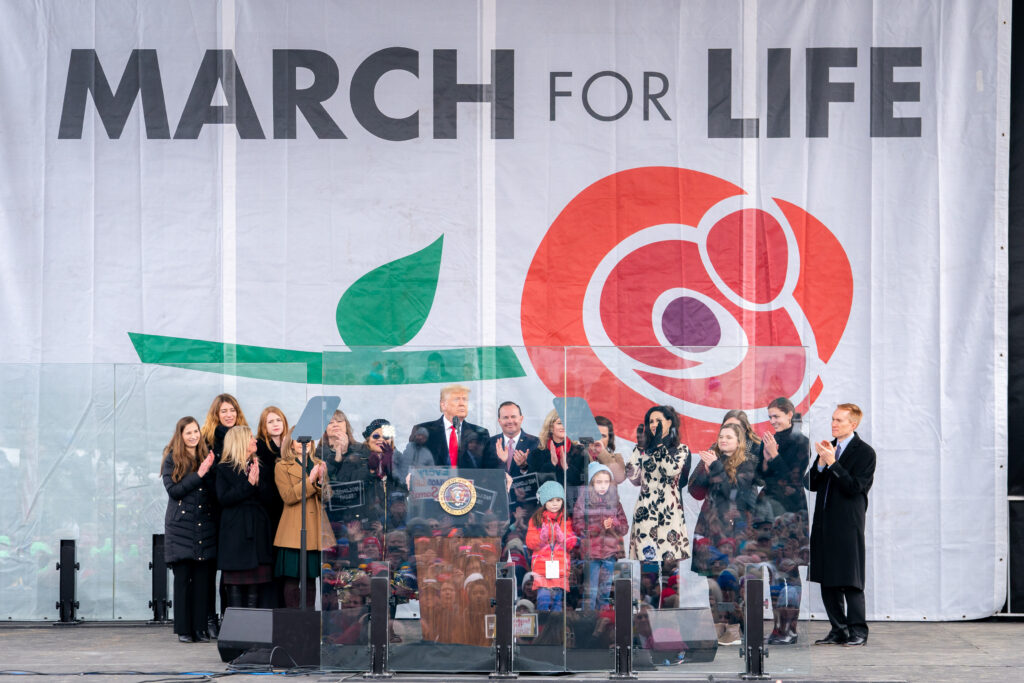The Global Gag Rule: A Canary in the Coal Mine of Foreign Aid Restrictions
 Featured image: A resident uses a USAID-supplied water pump in Ethiopia. A sticker on the pump reads: “USAID: From the American People.” “Buluko WP (B) (21).” Photo by USAID Ethiopia. Licensed under CC BY-NC-SA 2.0.
Featured image: A resident uses a USAID-supplied water pump in Ethiopia. A sticker on the pump reads: “USAID: From the American People.” “Buluko WP (B) (21).” Photo by USAID Ethiopia. Licensed under CC BY-NC-SA 2.0.
For the past 41 years, there has been a continuous tug-of-war over an oft-overlooked condition of aid from the United States of America known as the Global Gag Rule (GGR). Also known as the Mexico City Policy for the conference where it originated, President Ronald Reagan first prohibited foreign NGOs that received US family planning funding from using those subsidies to “perform or actively promote abortion as a method of family planning.” The 1973 Helms Amendment had already banned using US aid to directly provide abortions. However, before the GGR, NGOs could provide abortion services as long as they decoupled US funding from the funding used for abortions. The GGR was continually implemented by Republican presidents and revoked by Democratic presidents. When it was in force for a 21 combined years, NGOs that received financial backing from the US had to choose between limiting health services that people depended on or losing the resources that made their work possible.
In President Trump’s first term, he extended the GGR to all US-funded health NGOs, not just those providing family planning services. This covered 12 times the amount of funding, including resources for malaria prevention, PEPFAR (the US anti-HIV program), nutrition, sanitation, and more. This decision evoked broad international condemnation because of its clear impact on women’s health. The women and girls who seek or receive abortions from these foreign NGOs are among the most vulnerable, especially those who are LGBTQ+, HIV-positive, or survivors of rape.
The GGR has a chilling effect on how healthcare providers speak about and offer sexual and reproductive health services. It therefore does not reduce the number of abortions but leads to an uptick of unintended pregnancies, a rise of abortions, and less contraceptive use. However, the GGR was merely the canary in the coal mine of foreign aid. It was the first ideological limit on aid, but it would not be the last. It laid the groundwork for the normalization of arbitrary and partisan limitations on US aid, instead of a purely humanitarian and pragmatic aid policy. This has culminated in President Trump’s annihilation of USAID funding.

USAID, the US’s main foreign aid agency, was the first target of President Trump’s second term cost-agenda, largely driven by Elon Musk’s “Department of Government Efficiency” (DOGE). DOGE imposed massive cuts on USAID, allegedly to increase government efficiency, even as foreign aid is a tiny fraction of the federal budget. DOGE aims to cut 90 per cent of USAID’s contracts and 83 per cent of programs that USAID provides, as well as 99 per cent of departmental staff. These cuts will impact NGOs subject to the GGR. They have been chaotic, disastrous, and deadly, thrusting many NGOs and subcontractors into a complete functional and financial crisis. USAID underpinned the global system of foreign aid, so the cost of these cuts are widespread. The fate of USAID rests upon what happens in the US federal courts and if the Trump administration decides to cooperate with court orders. In the meantime, the impact of the GGR is neutralized because most aid is stopped, including the health and family planning funding that the GGR covers.
The Republican Party has consistently advocated for anti-abortion policy, as discussed in Petroni and Skuster’s 2008 article. The GGR was a win for anti-abortion conservatives, even as it was seen as an infringement on both human rights and freedom of speech by pro-choice and left-leaning groups. Republicans implemented a domestic version of the GGR through limiting Title X funding, which provides sexual and reproductive healthcare for low-income Americans, through abortion providers such as Planned Parenthood. The US anti-abortion coalition “won” its biggest battle in 2022 with the US Supreme Court overruling Roe v. Wade in Dobbs v. Jackson Women’s Health Center, erasing the federal right to abortion and allowing states to legislate unitarily on the issue. This decision has led to an increase in adverse maternal health outcomes and is widely unpopular.

The Republican party is in line with the anti-abortion movement, with Trump attending the annual March for Life. The GGR has been a way for Republican presidents to demonstrate their allegiance to the hardline anti-abortion right with little domestic blowback, all while numerous referendums have carried pro-choice sentiments, even in deeply Republican states. The GGR has evolved with America’s domestic political context, as Republicans first broadened its scope, and then promoted a more severe approach to foreign aid, questioning why the American government would help anyone who’s not helping America. The party has now abandoned the geopolitical utility of foreign aid for an ideological sledgehammer that makes life harder for the most vulnerable people across the globe.
The GGR is an exercise of “soft power aid,” a means of influencing other countries to side with the US on geopolitical issues. Unlike traditional forms of soft power, the GGR forces NGOs to comply with American domestic cultural norms in order to receive necessary funding. This system sets up a fraught international environment, where US ideological battles play out in the daily lives of people scattered across the world. The GGR set the precedent wherein the United States manipulates aid for political gains. Trump’s cuts extended this policy to the entirety of USAID. The consequences expose a fractious dichotomy in the administration of US aid — between the cynical political lens that uses disadvantaged people’s needs to facilitate support for the country’s geopolitical goals and the humanitarian lens that holds that efforts to make people healthier are an inherently worthwhile goal, even if the means are imperfect. The Trump administration has traded soft power for hard power, influencing geopolitics and international relationships through threats and fear, not aid and support. While there are inherent issues with the structure of US aid provision, the wholesale end of nearly all aid is appealing only to the few running DOGE.
There has been a clear and decisive shift in Republican policy and outlook from Reagan to Trump and the consequences are catastrophic for recipients of US foreign aid. Part of Trump’s populist appeal is “America First,” an inward-focused foreign policy, which appeals to many voters who believe that American tax dollars are better spent at home. In the first months of his second term, Trump has moved the US from the cornerstone of the international system to an unstable ally. The fact that US aid is intertwined with political objectives doomed it from the start, leaving the health of women in desperate need of care at the mercy of America’s ever-shifting domestic politics. It is a lot to ask for a country to act with purely altruistic intentions, but the slogan of USAID — “From the American People”— still resonates with many Americans. The US has exported bombs, hate, and terror across the globe. Now, Americans offer a gift for those in desperate need, whether it be a safe water pump, a bag of grain, a polio vaccine, or yes, even an abortion.
Edited by Daniel Harris
Featured Image: A resident uses a USAID-supplied water pump in Ethiopia. A sticker on the pump reads: “USAID: From the American People.” “Buluko WP (B) (21).” Photo by USAID Ethiopia. Licensed under CC BY-NC-SA 2.0.
